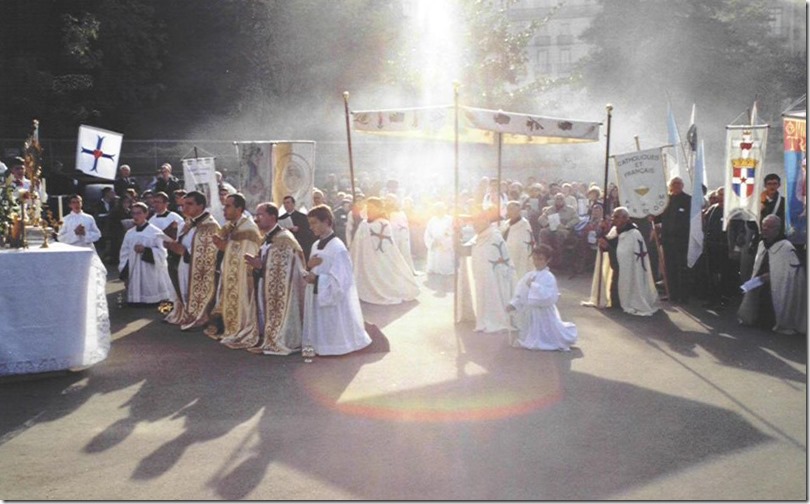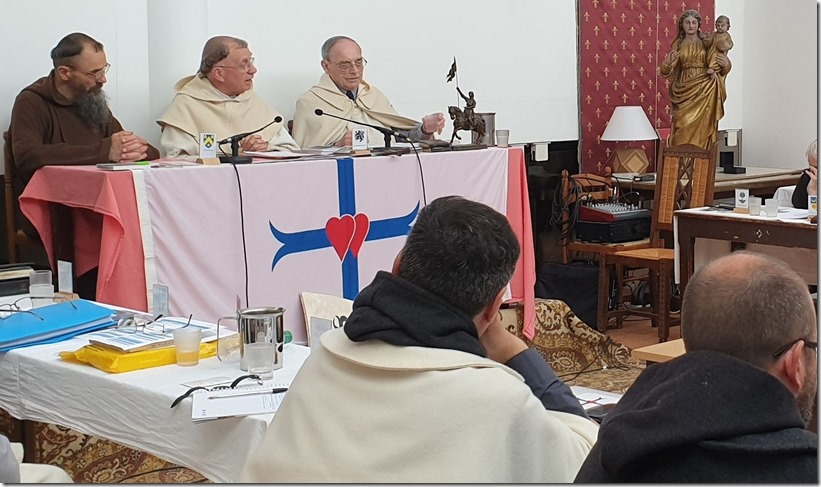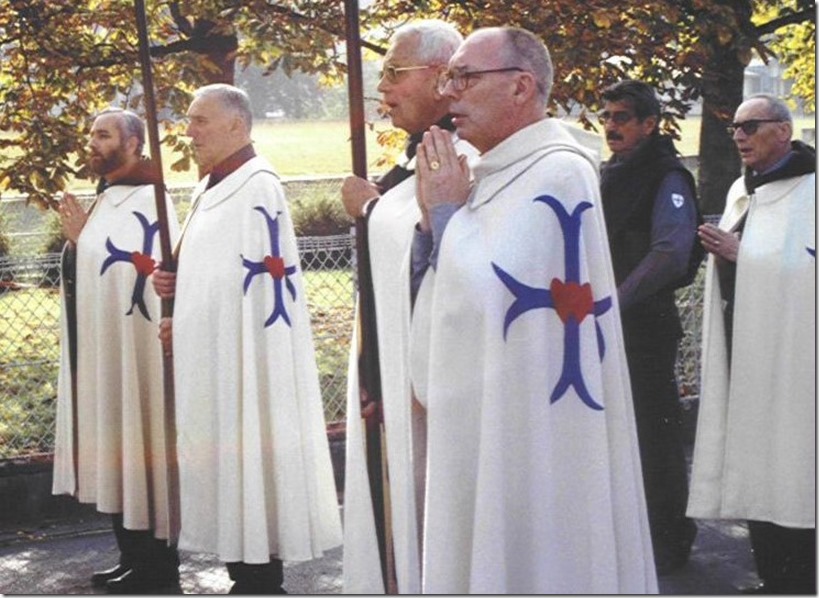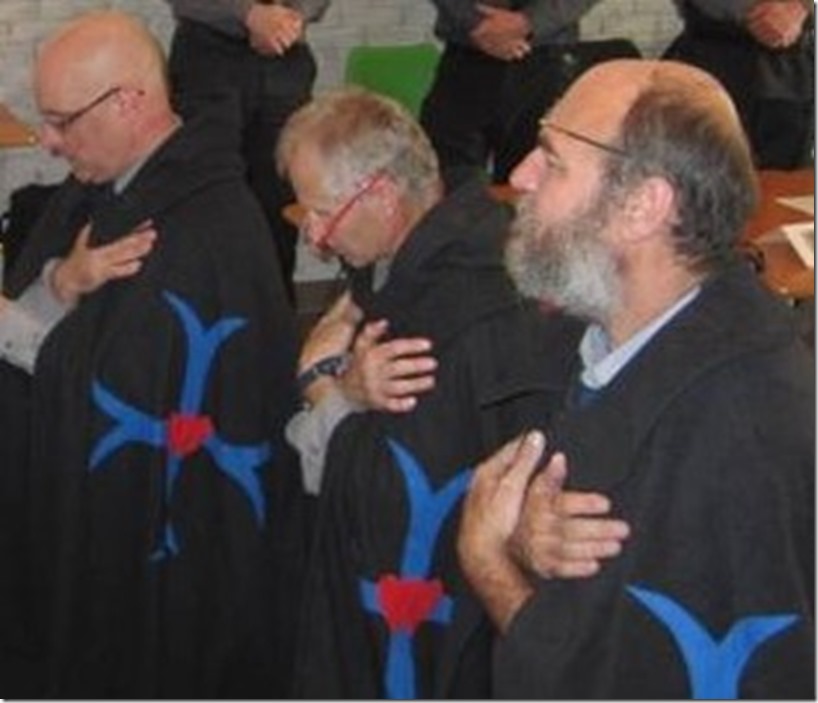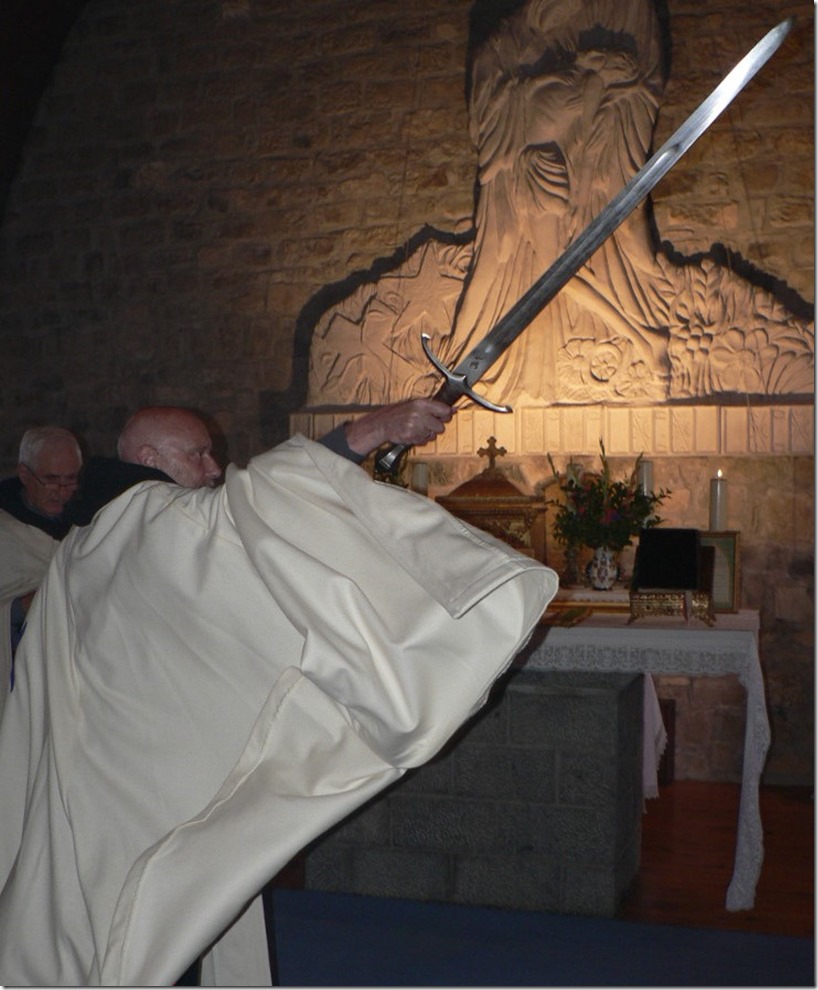HOLINESS IN THE FAMILY
Effort and Last Ends
by Brother François-Marie O.P. (Avrillé, France)
The Effort
THE DEVELOPMENT of supernatural life follows the same pattern as that of natural life: the mother, in giving birth to her child, rejoices in the fact that she has brought a man into the world, but to achieve the goal of forming an adult man, she and her husband will need a whole succession of generous efforts, labors, trials, and sufferings. That’s what education is all about.
Today’s society in which we live doesn’t make this work any easier, not only because of all the evil in it, but also because of the technical developments designed to make life easy. Why make the effort when, apparently, everything can be done so easily, so painlessly?
At a time when education is putting computers everywhere, it’s worth pondering this quote from Georges Duhamel’s Défense des lettres:
The day when teachers, who are our precious allies in this defense of civilization, stop teaching children the religion of the book, our world will be ripe for a new barbarism.
For decades, the law of convenience has governed all educational reforms. In the 1970’s-1980’s, for example, we saw the emergence of a method for learning lessons in one’s sleep! All you had to do was listen to the recorded lesson a certain number of times in your sleep, and your memory would retain it effortlessly. The lazy schoolboy’s dream had come true!
Historians have observed that, in the history of peoples, if the comfort brought by progress is not accompanied by a high moral ideal, it does not bring the flourishing of civilization, but its agony. In your families, in Catholic schools, you and your children’s teachers strive to give children the highest moral ideal possible: holiness. But, whether we like it or not, we are immersed in today’s society, and children are contaminated: we generally see a certain lightness, carelessness, superficiality, immaturity, and difficulty in taking charge of their own lives.
The important question is: how can we give children a taste for effort in education and school instruction?
It’s a long subject to cover! Let’s just highlight a few important points from Comment former des hommes by Henri Pradel (the quotations are taken from this author).
- Teach children that effort is necessary for a successful life, both natural and supernatural, and that it is always possible and relatively easy.
All spiritual writers agree in teaching that obedience, by identifying our will with that of God, makes us all-powerful over ourselves and makes us participants in the divine power to overcome evil. This is what made Lacordaire say:
Our will, which seems so weak to us, is capable of amazing things when it relies on obedience to accomplish God’s will in our various duties of state.
I want to! It’s the rarest word in the world, though the most frequently usurped. But when a man has the terrible secret of it, be he poor today of everything, be sure that one day you’ll find him higher than anything.
This confirms the saying: “Nothing is impossible to a valiant heart.” Often, it’s only the first step that costs. That’s why we need to inspire children with a benevolent optimism in the face of difficulties, and not accustom them to moaning.
- The joy of effort.
We need to show them in concrete terms that every effort is rewarded with satisfaction, and that the struggle more than makes up for the effort.
Effort is capable of producing something beautiful: a neat assignment, a well-understood and well-learned lesson.
- Develop initiative.
It’s important to get children to work on their own.
At first, when the child is young, you have to want to do things for him, then, little by little, you have to obtain his cooperation by proceeding in stages:
- Suggest a homework assignment.
- Point out the difficulties.
- Explain how to overcome difficulties and that victory will bring honor and joy.
- Appeal to his valor, his taste for fighting.
- Making sure it’s done right.
- Encouraging success.
- Show the shortcomings of the execution.
- Instilling a love of work well done.
As Goethe said, “Knowing and doing a single thing well leads to higher development than half-doing a hundred things.”
The love of a job well done is a powerful source of effort, which is why we must banish sloppy, incomplete, superficial, neglected work.
- Supernatural help
We have said that Catholic parents and educators strive to give the children God has entrusted to them the greatest moral ideal of all: holiness. Children are enthusiastic about this ideal, which is concretely embodied in the lives of the saints. They understand that if the saints succeeded in living well according to God and deserved to go to heaven, it’s because they believed in the truths revealed by God and summarized in the Creed, observed the commandments in an increasingly perfect manner, and succeeded in striving to overcome all obstacles. But what was the principle of their efforts? God’s grace, obtained through prayer and the sacraments.
Children, much more than adults, are aware of their weakness, and therefore of the need for prayer to ask divine omnipotence for the help they need to make the efforts required of them. They readily turn to the sacraments, especially confession and Holy Communion, to replenish their strength. For without God, nothing can be done in the supernatural order.
That’s why, our author concludes, education of effort will find in Christian faith and practice the indispensable help without which it will be doomed to failure.
The coming year is a good time for effort, so let’s encourage children to meditate on the example of Jesus and to turn to Him for the graces they need, so as to make and keep good, concrete resolutions in relation to their duty as students. We can help them do this by reading the lives of saints who have been model pupils, or by mottoes such as:
- “Nothing is impossible to a valiant heart” (Jacques Cartier).
- “Your life will be short, it must be full” (Jacques d’Arnoux).
- “You can only reach the summits by long and hard paths.”
The Last Ends
November is the month dedicated to the dead. It’s an excellent educational opportunity to get children thinking about the seriousness of life, all oriented towards our final ends, and to get them exercising the Christian virtues.
- Reflections on the seriousness of life and the last ends.
Nature itself helps us to reflect: at this time of year: vegetation loses its beautiful summer finery and seems to die; the days grow shorter, fog and bad weather envelop everything in grayness. So everything inclines us to go inward, to remember, to reflect. So it’s the perfect time to push open the door to the cemetery and enter.
There are the modest cemeteries of our villages, squeezed around the church, but there are also the cemeteries of our cities. If you haven’t yet been to your local cemetery, take your children! It’s a little town within a town, but what a difference! No traffic, no noise, no fuss. In this haven for the dead, only the monuments speak to us of the lives of people who, not so long ago, were alive like us.
Gravestones themselves are highly instructive. They provide information on the foliage of families, the circumstances of death, the profession of the deceased, the affection of the family of the deceased, etc. Children should be made to read the inscriptions.
After these observation “exercises,” the findings and questions will come naturally. Yes, like them, we all die one day. Where are they now? In hell? In purgatory? In heaven? Can we help them with our prayers? This is an opportunity to remind ourselves of the truths we learned in catechism. Indeed, in such a context, these truths will penetrate children’s minds more deeply.
- Practicing the Christian virtues.
Let’s remind our children that charity is not only exercised towards those we come into contact with, but also towards the whole Mystical Body. Yes, we can help our deceased, and they are waiting for us to do so!
St. Augustine says: “To show to the deceased, by the faithful who are dear to them, a love that remembers and prays is certainly profitable to those who, during their corporeal life, have merited such things to be useful to them after this life.“
Let us take action by reciting a De profundis or a decade of the rosary for the relief of the souls of those remembered at the grave.
In the cemetery, let’s show them the “corner of remembrance,” saying nothing, waiting for the questions to come: why isn’t there a monument? What are those little squares?
This is an excellent opportunity to talk to them about the respect due to the body, the duty to bury the dead with dignity, and therefore the virtue of gratitude as well as the virtue of faith, as Saint Augustine teaches us:
We must not despise or abandon the bodies of the deceased, especially those of the righteous and faithful, whose spirit has made holy use of them, as organs and instruments for every kind of good work.
For if the garment, the father’s ring and other such objects are all the more dear to descendants the greater their filial love, we absolutely cannot disdain the bodies themselves, united to us more intimately and more closely than any garment. They are not ornaments or instruments that we add to ourselves from the outside, but the very nature of man. […]
Everything we devote to burying a body is a duty of humanity imposed by the love that forbids hating one’s own flesh.
This is why we must be as concerned as possible for the flesh of our loved one, when the one who bore it is gone. And if those who do not believe in the resurrection do so, how much more must those who do believe in it do so: so that this duty, rendered to the body which is dead, but called to rise again and dwell eternally, may be like a testimony to this faith.
These are some excellent arguments to make those who choose cremation think again.
Perhaps a child will ask you how the dead will rise, or with what body. Answer him with these words of Saint Paul, who takes the comparison of seeds:
What you sow is not the future body, but a simple seed, for example of wheat or some other plant. But God gives this seed a body as he wills, and each seed its own body. All flesh is not the same flesh, but the flesh of men is different, the flesh of cattle is different […], the flesh of heavenly bodies is different, the flesh of earthly bodies is different […]. The body sown in corruption will rise incorruptible; sown in ignominy, it will rise in glory; sown in infirmity, it will rise in power; sown an animal body, it will rise a spiritual body (1 Co 15, 37-44).
After all these reflections, it will be easy to show children that the goal of life is to achieve this blessed resurrection. So we can’t let ourselves go. Our future depends on the conduct of our present life, and this life is passing quickly; we are not sure of tomorrow! That’s why we need to pray constantly for the graces we need to put Jesus’ teachings into practice, so that we can live truly Christian lives.
***********************************

